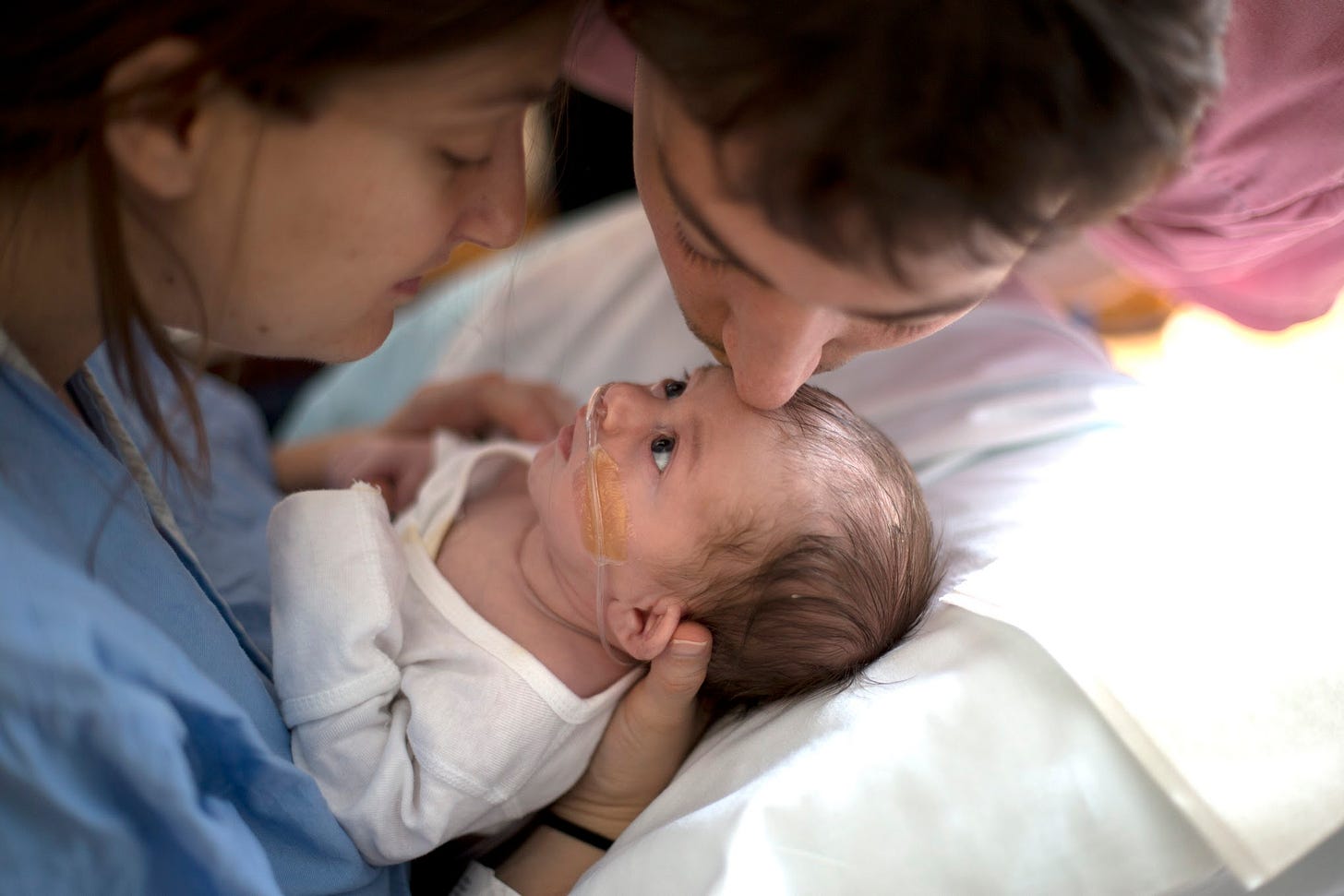Bargaining in the NICU
An excerpt of "Frontier: A memoir and a ghost story."
When the oxygen cannula in Jonah’s nose comes out, he relocates once again, this time across the NICU to the wing for the tubeless. The transition occurs when we take a break from his bedside—to the vending machine in the waiting area or through the hospital’s tubes and tunnels to buy a sandwich. There’s no fanfare. He exists in one place one moment, in another the next.
In this new area, babies writhe, cry out in hunger, fist and unfurl their hands. No one needs permission to scoop them up from their bassinets, to hold them or feed them or change a diaper. On this side of the NICU nurses care for three, sometimes four, infants at a time. I’m not used to the freedom of parenting under such light supervision. Often, I step outside of our pod and search for a nurse, any nurse, to ask: Is it time for a feed? Should I change his diaper?
You don’t need to ask, they remind me, trying to hide their exasperation. He’s your baby.
When we’re lucky, we get the nurse who cared for Jonah during his days in the cap, who stood beside us when the MRI results came in. She coaxes us through this stage of parenting, too, with no hint of impatience. She parents us while we parent Jonah and often I wonder what we will do without her, whenever we are discharged. I worry I’ve become dependent on her and that, without her, I’ll find myself stuck back in one of Erikson’s earlier stages of development—a toddler somehow left to care for a baby.
Here, parents smile and chatter, count days until discharge. They are not waiting for damning diagnoses. Here, we get to bathe Jonah. We dip towels in a tub of warm, sudsy water and dab his skin, careful not to press too hard. With a plastic-bristled brush made for the quaintly normal cradle cap, we instead unfurl glue that stubbornly clings to his scalp from EEG electrodes. Before, in the other wing, they tried to soften the residue with baby oil but only succeeded in slicking his hair back in dark whorls against his scalp. Still his head behind the ears is swollen—maybe from the cooling cap or the injury or some combination of the two. We rinse and rinse again.
Through pregnancy I feared some menacing force (contaminated food, undetected genetic anomaly all too common in Ashkenazi Jews, asymptomatic but dire infection) would invade my uterus and corrupt my child. There was superstition at play, an anxious magical thinking; if I worried about the thing, then I might prevent it from coming to pass. Jed, ever the calm optimist, felt certain all would go smoothly. When I accidentally ate a forbidden food, he comforted me with his quick and certain denial that anything bad would happen; he wouldn’t entertain the idea and so neither should I. We’d go back to watching Breaking Bad on a laptop propped on his knees in bed, and I would try to emulate his certainty.
Still, when the doctor made his pronouncement while I lay in the delivery bed after Jonah was whisked away, or later, when the neurologist read the MRI results, we both plummeted. No previous worry inoculated me against the shock; no intrinsic calm inoculated him. This means you’re already great parents, our favorite NICU nurse says, of our pain. But I fear it’s easier for her to say something, to assign meaning, rather than sit silently and watch.
Through pregnancy I feared some menacing force (contaminated food, undetected genetic anomaly all too common in Ashkenazi Jews, asymptomatic but dire infection) would invade my uterus and corrupt my child. There was superstition at play, an anxious magical thinking; if I worried about the thing, then I might prevent it from coming to pass.
When my birthday rolls around, Jed and I walk down the street to the donut shop with the pink and white striped awning and choose an assortment of glazed and chocolate and cream to leave in the nurses’ lounge, still counting on the donut karma to come through, to change our outcome, to bestow favor on our child.
Jewish folklore holds that Adam’s apocryphal first wife, Lilith, had a penchant for stealing newborn babies from their beds. Centuries ago, people took all sorts of precautions to ward off this vengeful woman, employing amulets and red ribbons and spells to protect their children. If they created enough protective barriers, they might outwit the demon. If I buy enough donuts, I too might be able to stop Lilith in her tracks.
My new identity is less mother than it is gambler, dealmaker. My bargaining is retroactive, too. I would have chosen a C-section and hemorrhaged if it would have spared him, I tell Dr. G at one of her visits, after she explains why she did not order surgery.
I can handle motor delays, I announce to Jed, but not cognitive.
I’ll take seizures, I say to the neurologist, when he stops by the new wing to check on Jonah, tap a wand on his toes and shine a penlight into his eyes, over disability. Then, later, when I understand what I’ve offered up, that seizures can liquify what seemed solid, I rescind: no, no, anything but seizures. I lay out what I can and can’t handle, but no one’s been empowered to bargain with me, not the doctors, and certainly not the removed, Jewish god.
Rationally I know none of this bartering matters—that’s not the way the world works—but why not try? Pascal’s wager applies this logic to faith; a person might as well believe, because there are only upsides to believing and only downsides to not. The downside here is obvious, though; I might trick myself into thinking I’m responsible for more than I can control. If a Jewish woman failed to procure an amulet against Lilith, and her baby did not make it, did she blame herself? Did she ever overcome the guilt? Will I?
Magic also abounded in the medieval Christian world. Scholars recently determined that women wore parchments known as birthing girdles during pregnancy and delivery. These girdles contained prayers and religious imagery thought to form a kind of protective armor to guide them through danger. One of the manuscripts the scientists analyzed connects wearing the girdle to a happy outcome: If a woman travel with chylde gyrdes thys mesure abowte hyr wombe and she shall be delyvyrs wythowte parelle. Protestants, including American Puritans, dismissive of such magical devices and incantations, emphasized that birth, whatever the outcome, manifested God’s will. Now, playing at my own game of dice, I’m not sure which approach I prefer—the puritanical route that absolves the individual of responsibility (it’s all in God’s hands, fate is predetermined), or the medieval and magical, which, however fanciful, at least gives the illusion of agency.
My new identity is less mother than it is gambler, dealmaker. I can handle motor delays, I announce to Jed, but not cognitive. I’ll take seizures, I say to the neurologist, when he stops by the new wing to check on Jonah, tap a wand on his toes and shine a penlight into his eyes, over disability. Then, later, when I understand what I’ve offered up, that seizures can liquify what seemed solid, I rescind: no, no, anything but seizures.
On the phone, friends say: Jonah is lucky to have you as his parents. I’m unsure of many things but I am sure luck has nothing to do with this. It’s the puritanical approach sneaking in and overriding the magical thinking; Jonah and me and Jed were not thrown together by some act of fate. We are not meant to be, and we have no say in what comes next. It’s all random.
Luck carries two different if connected meanings, depending on use. Luck can be either mathematical or moral. One type encompasses the notion of randomness, of statistical chance. This luck is dispassionate. It is neither intrinsically good nor bad; it simply is. It’s the luck of a coin toss, of a random, computer-generated set of numbers. Then there’s luck as in lucky, as in to break a leg, as in fingers crossed. This luck means good. It’s a state of being or a hopeful striving for an imagined outcome. You can turn this kind of luck into its opposite by adding the word “bad.”
We have experienced both kinds—really all three—wrapped in one. Jonah’s injury was an anomaly, unexpected personally but not statistically, not if you examine the probabilities; it had to happen to someone somewhere—I had just stupidly, selfishly really, assumed it would not be us. We were also deeply unlucky to find ourselves in that small fraction of bad outcomes and, now that Jonah has pulled through, is off the vent, is breathing and seeing and moving, we are, perhaps, maybe, ever so slightly lucky, as in good luck. There remains a part of me that finds even the lucky piece unlucky, the part of me that has not signed up for this sort of parenting and would like a do-over, the part of me who is hesitant to use Jonah’s name. Each day that I lock eyes with Jonah that feeling grows more remote, but it does not leave entirely and I worry it may never.
The family with the healthiest baby has by now disappeared from the unit. I didn’t see them go but I do see their berth emptied of all signs of their presence, as though they were never there to begin with, slate wiped clean. He’s gone, I tell Jonah. You don’t have to worry about him anymore. I hated them for their callousness, but also for their luck. They existed in contrast to our luck. They were a version of us if we had fallen on the other side of the probability line. They didn’t know it, though; they thought they were unlucky, stuck in the NICU for a small, silly reason, against their will and in contradiction with their birth plan. Luck is in the eye of the beholder.
Jonah’s injury was an anomaly, unexpected personally but not statistically, not if you examine the probabilities; it had to happen to someone somewhere—I had just stupidly, selfishly really, assumed it would not be us.
Before the modern era, women’s lives centered around reproduction. With only unreliable folk remedies for contraception, women easily found themselves stuck in a near-constant cycle of pregnancy, delivery, and postpartum recovery. Each time their own safety was far from guaranteed. Some pregnancies resulted in live babies. Some in stillbirth or miscarriage or abortion. Some babies came out sick or died in infancy.
Bad outcomes (a deformed fetus, for instance) were often attributed to divine retribution. This is, of course, different from luck. Divine retribution is about just dessert: bad people getting bad things. In spite of myself it’s tempting to take on this kind of thinking. Not in some rational way—I have sinned and so this is what God has wrought—but via a primal disgust with my body. I flinch when Jed reaches out to touch me, a kind touch, to let me know he is there, really there. That he hasn’t forgotten about us in all of this. I flinch because I don’t want to inhabit the thing that failed me and Jonah, the thing that must be rotten, and Jed’s touch is a reminder that I do and I can’t escape it.








Beautifully written, following an associative emotional line through both personal experience and research. Thank you for sharing it. I wish you all the good lucks—
Love this excerpt and really can't recommend the book enough!